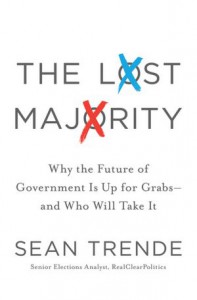I kind of hate having to a), redo a previous book; and b), do one that’s non-fictional: but The Lost Majority: Why the Future of Government Is Up for Grabs – and Who Will Take It is frankly essential reading for people talking about inevitable and permanent electoral victories. Spoiler warning: neither of those happen. And Sean Trende will happily explain to you why. So if you have not yet gotten this book, I will repeat what I wrote last time: Continue reading (Revisited) Book of the Week: Lost Majority.
Tag: the lost majority
Book of the Week: “The Peshawar Lancers.”
S.M. Stirling’s standalone book The Peshawar Lancers (there is a short story set in the same universe, mind) is an alternate history novel that asks What would happen if you dropped a comet or an asteroid into the Atlantic Ocean during the height of the Victorian era? One answer apparently would be Eventually, Rudyard Kipling’s dream world. It’s all very steampunk, in the brass-and-gears sense: but it’s also very deliberately evocative of Haggard and Kipling and Fraser (to give an idea, the Flashman novels are not so much evoked in this book as they were slipped a Mickey Finn and shanghaied to it). I enjoyed it greatly, not least because Stirling is always good at showing the world-building. Lots of fun and it’s a shame there hasn’t been a true sequel.
Adieu, The Lost Majority: Why the Future of Government Is Up for Grabs – and Who Will Take It. We’ll have need of your services again soon enough, I fear.
Moe Lane
RedState Review: The Lost Majority.
 Sean Trende of Real Clear Politics is one of the better analysts of basic political trends out there, so I was looking forward to his new book The Lost Majority: Why the Future of Government Is Up for Grabs – and Who Will Take It. I was fortunate enough to snag a review copy for RedState, and found it to be a fairly persuasive argument that our general assumptions about the implications of any given election are usually wrong. It was not exactly a groundbreaking argument for me, but then I’m already familiar with Sean’s writing on RCP.
Sean Trende of Real Clear Politics is one of the better analysts of basic political trends out there, so I was looking forward to his new book The Lost Majority: Why the Future of Government Is Up for Grabs – and Who Will Take It. I was fortunate enough to snag a review copy for RedState, and found it to be a fairly persuasive argument that our general assumptions about the implications of any given election are usually wrong. It was not exactly a groundbreaking argument for me, but then I’m already familiar with Sean’s writing on RCP.
Sean makes three claims in The Lost Majority:
“First, that the 2010 midterm elections were a result of Barack Obama and the Democrats misreading both their mandate and how they had been brought to power, imagining a realignment in 2008 when, in fact, none had occurred. Second, that the emerging partisan majorities described by theorists from both parties are mirages. Third, that the entire concept of realignments/permanent alignments, which underlies much of the misbegotten analysis of the 2008 elections, is bankrupt and should be abandoned.” (page xiii)
The first claim is not exactly going to be controversial to anybody who isn’t a Democrat; the second and third are perhaps more likely to be matters of some controversy to ideologically-minded readers. They should not, however, be dismissed out of hand; after all, there were a lot of very book-smart people advising the Democrats in 2009 and 2010 who based their opinions on the belief that long-term partisan majorities are inevitable and that alignments are possible The collapse of their models should at least be seen as cautionary.
#rsrh Sean Trende buries the lede on the Teixeira/Halpin report…
…sure, he straightforwardly demolishes those two’s latest attempt to resurrect the rapidly-cooling cadaver known as the “Emerging Democratic Majority” (short version: the demographic trend is not automatically the Democrats’ friend). But Sean unaccountably hides the real news: he’s got a book coming out next month.
I don’t buy political books, but I’ll buy The Lost Majority: Why the Future of Government Is Up for Grabs – and Who Will Take It. Sean Trende was the first guy I can think of who was patiently explaining that: a, the Democrats were likely to lose the House in 2010; and b, passing Obamacare would not save them from that fate. In other words, somebody with a pretty good track record right now.
